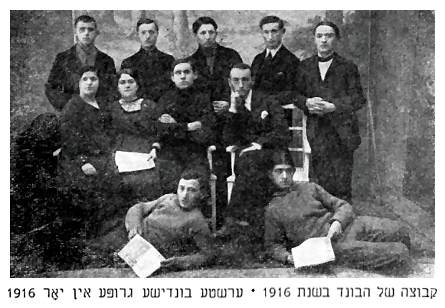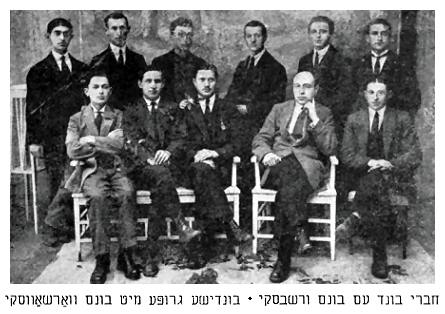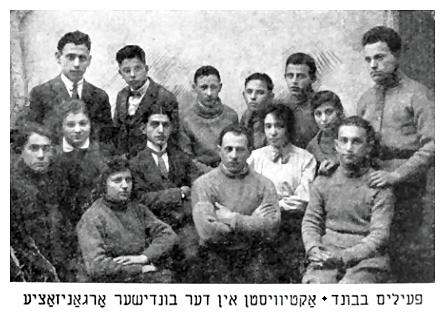
Seated: A. Greenberg, M. Gotliber, Shifra Loznik, N. Apel and I. Fried
|
[Page 158]
Yehoshua Grosbard (Vyelkabrodeh) Haifa
Home and Surroundings in My Formative Years
In the years 1909-10 my family moved from Sorotz to Ciechanow. I was still a cheder boy at that time. My father's occupation was bindery and I read the books that my father bound. Amongst the youths who gave books to bind there was a group of boys whose books I carried over to the illegal library at that time. I was (in a room) in the loft in the home of the Lichtensteins on Proshnitzer Way where the teacher Tchurek lived. I was told to watch out for “Bekerl” and make sure that he does not see the destination to which I am carrying the books.
I had the feeling at that time that I was doing something secret and dangerous. I tried to acquaint myself with the boys who were coming in to us. They were: the brothers Yosef and Yekhezkl Trombka, the Berman brothers, Moishe Kviat, Moishe Kleinyud, and others. Adjoining us lived the Perlmutter family. There were several grown daughters: Shaindl, Faigeh, Manya and a brother Hershel and his bride, Nebkeh Ciechanower. I often saw them, always with a book in hand.
I was particularly interested in a young boy with a round kapelush (hat) on his head and a book under his arm. When I discovered that he works as a printer, I imagined that he was a striker or a revolutionary – since I had heard stories since I was five years old. From this young boy there later emerged the Worker Party's worker -- Yosef Maier Perlmutter.
The teacher, Yehuda Eliezer Divan, who gave Hebrew lessons, also interested me. He taught two girls who were our neighbors, and I listened in on his lessons that had a very strong influence on me.
[Page 159]
As the seamstress -- Chaya Rivka Robota -- where I used to bring meals for my older sister, Libah, who worked there -- I got to know Paula and her younger sister -- Tauba Dresner, Faigeh Listopoel and her brother, the seamstress Milner, Tchurek, Pshisusky and others. In their book discussions I used to hear the names of writers that I recognized from the title pages of the books that my father bound. All those boys and girls I considered as members of the loft room in Proshnitzer Way .
The older I got the more broadened became my acquaintance with young people such as: with the Mundzak's, Garfinkls, Vovo Burshtein, Finkelsteins, Remboims, Beresh Mlovsky. I also heard about Laznick, Isaac Kostsheva, who left for America. They were all, at that time, the “Enlightened” ones of Ciechanow.
Just before the outbreak of World War I, we lived at Aaron (Gelbard) Kovel on Ploinsker Way. The Divan family were our neighbors. The Rosens came to them from the district on the “Glinkes” there was a large military medical division. There, there were many Jewish soldiers. In the evenings they used to come to the Jewish homes where there were young people. They used to enjoy themselves and talk about politics, literature and communal matters, enjoy themselves with young ladies -- played lotto, made latkes. Amongst the soldiers there were cultured and educated ones. This I understood later when I recalled their talk and discussions.
Winter time, the soldiers were billeted in private homes. They made sure the houses had fuel for heating. Where food was lacking, they also brought food, and books to read. In our house there were billeted: a medic, a Jew Shenigson, and an older Russian. Shenigson liked to tell folk tales and sing Jewish national songs and workers' songs. His listeners were: my sister and I myself. From time to time the soldiers would arrange other entertainment in the home of Berl Agradnik or at the Divans'.
During wartime, when binding no longer supplied one with an income, we opened a tea-house in Rebbe Yitzhak Dovid's house. In the evenings many officers and soldiers came to us from the “Volunteer Ullaner Regiment.
[Page 160]
In one of our rooms there was billeted an officer whom his colleagues nicknamed “Kniaz.” The Russian military men discussed, far into the night, important (blank) and cultural matters. I am sure that these people played a role in the future developments. Particularly one who when he had conversations with my father, would ask him questions about work, earnings, about a school for the children, about relations with the Polish neighbors, etc. This atmosphere had a great influence on my educational development.
After the Germans, during World War I, conquered Poland, and the Jewish communal life was revived after being completely suppressed, during Czarist times, the library Hazamir opened in Ciechanow. When my father decorated the library and the reading room, and I helped him in this work, I asked for membership in the Hazamir instead of the tip money. The executive of the library were: Yosef Trombka, Yoel Garfinkl and Yosef Maier Perlmutter. They tested me, asking me why I want to become a member of Hazamir, what books I had read. Finally, they decided to grant me membership in the library as a reader only. Because of my young age, they did not want to grant me regular membership.
At Hazamir I met a lot of new people. With many of them I am still in contact to the present day in close friendship. My friends from that time are: Shifra Laznik, Shaiyeh Kostsheva, Soreh Faigeh Kostsheva, Gita and Maier Gotliber, Chaya Zieloner, Montchke, Yudl and Laib Bronshtein, Noske Apel, Rodzinek and others.
In Ciechanow there were also war refugees, amongst them some interesting young people from Warsaw such as: brothers Maier and Shamai Tenenbaum, Shamai Rapoport. In the evenings after work, we decided to organize reading groups in Hazamir. We met twice a week. One person would read and then we would have a discussion about it. We evaluated the work from an ethical-moral standpoint. We were inspired by Ven Keiten Klingn (When Chains Ring) by Olgin, from the poetry of Morris Rosenfeld, Bashevis and Edlshtat. We also discussed I. L. Peretz, Multatuli, and enjoyed Sholem Aleichem's humor.
[Page 161]
Literary evenings also took place in Hazamir with recitations and performances, to which a large crowd came. The registrar, Binyamin Eisenberg, was also a good reciter. Zak Levy often came from Warsaw. He was, at that time, considered one of the best Jewish artists. Under Eisenberg's direction, Chirikov's Di Yidos (The Jews) was performed. The performers were : I. M. Perlmutter, M. Gotliber, Sh. Kostsheva, Shifra Loznik, my elder sisters and I myself.
For me and for my sister it was quite a revolution to act on stage. We guarded ourselves lest our father find out about this. But it turned out that our fear was unfounded. A few days after the performance, my father asked me if I would like to participate in a performance for the benefit of the Free Loan Society, because he heard that I had acted very well. Wiselitz, the well-known actor, also performed in several plays and did recitations. He used to come to Ciechanow to his friend Gips, a Hebrew teacher, a talented reciter and cultural activist. Gips gave lectures on Zionist themes. There was another teacher in Hazamir, Plutzer, a capable cultural activist and a Zionist.
At that time political groups started to form within Hazamir, with different orientations: Zionist youth mainly from middle class homes; Poele Zion, Party workers, whose leaders were: Naftali Sarek, Boruch Mordecai Malina. The majority of young people from working parents' homes started to organize the Bund. From the reading circles in Hazamir, there was a group who concerned themselves with establishing a workers' paper in Ciechanow. Very active in this respect were the members: Kostsheva, Bitterband Chaya Zeliner (who was later called the “Bubbe of the Bund.” From Warsaw came chaver Yevetz, and though not everyone understood his political terminology, we nevertheless felt that this connects us with all the poor throughout the world, who strive for a better, nicer life. Afterwards we met more often, read together, discussed, and became like a family. During Party strife in Hazamir we consulted in advance and dealt according to certain principles.
[Page 162]

|
Seated: A. Greenberg, M. Gotliber, Shifra Loznik, N. Apel and I. Fried |
|
|
The war ended. From Hazamir there becomes Folk-Library. The Party struggle grew even stronger. The majority of the members were with is because we demanded that the Folk-Library should be the central place for organizing help for the poor and needy. These were harsh postwar years. Hunger and epidemics were prevalent. Our chavera showed superhuman devotion when the cholera epidemic swept over Ciechanow. The youth, after a hard workday be on duty all night to give help to the sick.
The Party discussions between Zionists and non-Zionists grew even stronger in the Folk-Library. Conflicts arose, and finally the Zionists left the cultural institution.
The library developed further in spite of the conflicts and disturbances that sometimes even took the form of fights. Finally, the influence of the Bund grew. Bundist speakers started to come more often from Warsaw. Professional societies started to be organized of leather workers, servant maids, etc.
[Page 163 - upper]

|
|
|
[Page 163 - lower]

|
Seated: Rachel Zilbershtrom, Mala Pafa, N. Apel, G. Rosenshtein. Last row: V. Kostsheva, Sh. Kostsheva, I. Bronshtein, Shifra Loznick |
|
|
[Page 164]
blank
[Page 165]
Clarification work was also conducted. The Bund gained intellectuals. The teacher, Isaac Greenberg from Mlawa, a fiery speaker, a deeply cultured man, an artist and director, had a great influence on many young people from middle-class homes, such as : Mala Pafa, Chaya Burshtein, the two Vashnievsky sisters, May Aigengold, Zilbershtrom Formes and others. Greenberg was active in all respects -- gave lectures, established self-learning groups, conducted them, directed theater performances and performed himself. Also active were : the teacher, Mlinek and Vovo Burshtein.
The Folk Library got a Bundist name: “Grauser Club,” named after the Bund leader who died young, Branislav Grauser. The club, that consisted mainly of the greater part of working youth, had a large hall with a stage, a library, a reading room, a drama group that performed, at that time, Pshivishevsky's “Shmai” (Snow), Strindberg's “Father”; Bimko's “Ganovim” (Ships), Hirshbein's “Uncle Boyle”. We also read monologues of Sholem Aleichem, Peretz's “Di Lvoneh Dertzailt” (The Moon Tells), and others. The drama group sometimes performed in the surrounding shtetlech. We used to exchange performers or borrow people from a similar drama group in Mlawa.
|
JewishGen, Inc. makes no representations regarding the accuracy of
the translation. The reader may wish to refer to the original material
for verification.
JewishGen is not responsible for inaccuracies or omissions in the original work and cannot rewrite or edit the text to correct inaccuracies and/or omissions.
Our mission is to produce a translation of the original work and we cannot verify the accuracy of statements or alter facts cited.
 Ciechanow,
Poland
Ciechanow,
Poland  Yizkor Book Project
Yizkor Book Project
 JewishGen Home Page
JewishGen Home Page
Copyright © 1999-2024 by JewishGen, Inc.
Updated 18 June 2003 by LA